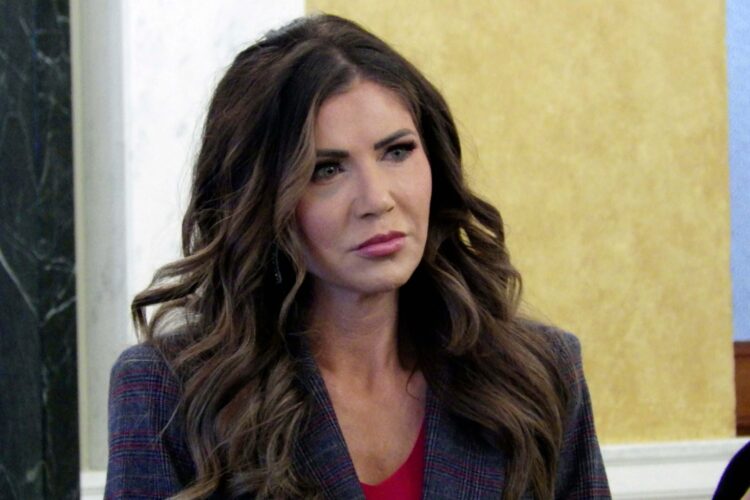South Dakota Governor Kristi Noem has been banned from all nine of her state’s tribal reservations—roughly 20 percent of the land under her jurisdiction—over “offensive” comments about rampant drug use and failing education systems within Native American communities. The governor’s “banishment,” announced by the last of the tribes on Tuesday, theoretically bars her from visiting tribal territories until she apologizes for alleging ties between reservation leaders and Mexican drug cartels.
Noem’s offending comments came during an emergency press conference in late January, when she claimed that “the cartels are using our reservations to facilitate the spread of drugs throughout the Midwest.” In another press conference in March, she further claimed that tribal leaders are “personally benefitting” from cartel connections to explain “why they attack me every day.”
As recently as last week, the governor stated that “[cartels] definitely have set up operations in South Dakota.”
“We’ve seen the Bandidos there, MS-13 is there,” she continued. “They’ve recruited members from the tribes.”
Learn the benefits of becoming a Valuetainment Member and subscribe today!
Following Noem’s initial comments in January, the leadership of the Standing Rock Sioux, Crow Creek Sioux, Rosebud, Cheyenne River Sioux, Oglala Sioux, and Lower Brule Sioux tribes began passing resolutions to “banish” the governor from their lands as punishment for the offense. The Yankton Sioux Tribe and the Sisseton Wahpeton Oyate Tribe followed suit earlier this month, and the Flandreau Santee Sioux Tribe held the final vote on Tuesday.
“[Flandreau President Tony Reider] informed the governor that a ban from our territories is imminent and requested that the Governor refrain from making future blanket statements that offend the tribes within the boundaries of the State of South Dakota, some of which depend on state services for the needs of their people,” said a readout from the tribe’s emergency meeting provided to CNN. “It was recommended that the Governor clarify her statements and issue an apology to all tribal nations for the misunderstanding.”
“Until such a time, the Executive Council and the people of the Flandreau Santee Sioux Tribe stand with our fellow nations,” the readout continued.
The tribes notably did not indicate how this banishment would be enforced were Noem to attempt a visit to a reservation.
The vote came after the tribal leaders reportedly had a “respectful and productive” meeting with Noem on Sunday. Despite the governor’s cooperation, the tribe felt the need to “stand in solidarity with our fellow tribes in South Dakota” to avoid “coming up on the wrong side of history in this moment.”
In an accompanying statement, Noem’s office insisted that “it was never [her] intent to cause offense by speaking truth to the real challenges that are being faced in some areas of Indian country.”
“I want to focus on solutions that lead to safer communities for all our families, better educational outcomes for all our children, and declining addiction numbers for all of our people,” the governor added. “It is my hope that the Flandreau Santee Sioux Tribe will give us the opportunity to partner together in a way that can be an example for all.”
Related: Trump VP Contender Kristi Noem Forced to Defend Killing Her Dog
Despite objections to Noem’s statements, rampant drug abuse and cartel activity on the country’s Indian reservations is a significant problem for Native residents. As multiple outlets have reported this year, Mexican cartels are actively exploiting jurisdictional loopholes and limited law enforcement supervision to embed their operations into the reservation system across the Western states. This has allowed record amounts of fentanyl and other lethal drugs to flood into tribal lands.
“We are fighting a losing battle. The cartels are winning, the drug dealers are winning,” Jeffrey Stiffarm, president of Montana’s Fort Belknap Indian Community, told Congress last month. According to multiple studies by national health experts, substance use among American Indian youths on reservations is significantly higher than among those in the general population, and Native communities are vastly more susceptible to the opioid crisis.
Per the Centers for Disease Control and Prevention, “community assets found in Indigenous Knowledge” are frequently used to treat overdoses given a lack of medical resources—but these treatments are largely questionable in their efficacy.
“Banishing me does nothing to solve this problem or to help those who are suffering horrific tragedies,” Governor Noem said last week. “I want to focus on solutions that lead to safer communities for all our families, educational outcomes for all our children, and declining addiction numbers for all our people.”
“We cannot tackle these issues without addressing the problem: dangerous criminals who perpetuate violence and illegal activities in all areas of our state. We need to take action,” she continued. “It is my hope tribal leadership will take the opportunity to work with me to be an example of how cooperation is better for all people rather than political attacks.”
Connor Walcott is a staff writer for Valuetainment.com. Follow Connor on X and look for him on VT’s “The Unusual Suspects.”
Got a hot scoop or an idea for a story? Connect with the VT writers on Minnect!



















Add comment